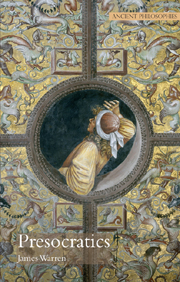Book contents
- Frontmatter
- Contents
- Acknowledgements
- Sources and abbreviations
- Chronology
- Map of the ancient Mediterranean
- 1 Introduction: reading Presocratic philosophy
- 2 Ionian beginnings
- 3 Xenophanes
- 4 The oracles of Heraclitus
- 5 Parmenides
- 6 Reactions to Parmenides
- 7 Anaxagoras
- 8 Empedocles
- 9 Democritus and Leucippus
- 10 Epilogue
- Guide to further reading
- Notes
- Bibliography
- Index of passages
- Index
1 - Introduction: reading Presocratic philosophy
- Frontmatter
- Contents
- Acknowledgements
- Sources and abbreviations
- Chronology
- Map of the ancient Mediterranean
- 1 Introduction: reading Presocratic philosophy
- 2 Ionian beginnings
- 3 Xenophanes
- 4 The oracles of Heraclitus
- 5 Parmenides
- 6 Reactions to Parmenides
- 7 Anaxagoras
- 8 Empedocles
- 9 Democritus and Leucippus
- 10 Epilogue
- Guide to further reading
- Notes
- Bibliography
- Index of passages
- Index
Summary
Our primary interest in what follows will be in thinking about early Greek philosophers' views on such topics as the nature and origins of the world, our knowledge of it and how we should act within it. We shall also be interested in thinking about the arguments they offered for these conclusions. But there are some crucial questions and difficulties to be addressed before we can begin, since they bear on the nature of our evidence for early Greek philosophy and the nature of the context in which the early Greek philosophers lived and worked. These factors shaped first the production and then, in turn, the transmission of the philosophy we shall go on to consider, and therefore deserve to be given serious attention.
What is “Presocratic” philosophy'? What does this book include and what does it leave out?
The term “Presocratic” is a modern classii cation not found in the ancient sources themselves and, although it is still commonly used, some scholars have argued that it ought to be allowed to fall into disuse. Not only is it chronologically inaccurate, since some of those philosophers usually classii ed as “Presocratic” were contemporaries of Socrates and others, notably Democritus, probably outlived him, but it is potentially misleading in other ways. A full account of all Greek thought in the period up to the death of Socrates in 399 BCE would include a far wider cast of characters than do standard accounts of Presocratic philosophy.
- Type
- Chapter
- Information
- Presocratics , pp. 1 - 22Publisher: Acumen PublishingPrint publication year: 2007



